#diadochi
Text
The Hellenistic Age was a period of massive change for the ancient world. Sparked during the reign of Alexander the Great, it lasted until the rise of the Roman Empire in 31 BC.
17 notes
·
View notes
Note
hello!!! Dr. Reamen, I wanted to ask, did the Ptolemies know that Alexander was not related to them or did they really believe their own propaganda about being descendants of ATG?
Just a quick clarification: the claim was that Ptolemy I Soter was the bastard son of Philip, so they weren't descendants directly of Alexander, but of Alexander's father, making them Argeads. The person who made the claim was almost certainly Ptolemy's creepy son Ptolemy Keraunos,* who nobody liked much. He kept flitting between Diadochi courts when he'd outworn his welcome, assassinated someone, or conspired to assassinate someone. Ptolemy himself replaced him as heir with his younger brother, which started his perambulations, looking for support.
This claim also seems to have been made after Ptolemy I's death (contra Tarn). Ptolemy Keraunos made it because he was (briefly) king of Macedon. This was after Kassandros died (another liked-by-nobody figure who's father also passed him over), and his sons killed each other until Demetrios Poliorketes killed the last one. After Demetrios died, things in Macedon went wiggy (or maybe wiggy-er), which is when Ptolemy Keraunos took over before being killed in battle with invading Gauls. Antigonos Gonatos finally stabilized Macedon and instituted the Antigonid dynasty, which lasted.
Yet if Ptolemy Keraunos was making a bid to be king of Macedon, you can see why being the grandson of ol' Phil would be quite useful. Yes, it gives the Ptolemies a connection to Alexander, but it's really the connection to PHILIP, who was much more popular back home in Macedon, that Ptolemy Keraunos wanted.
Did later Ptolemies believe it? Possibly. Certainly the further they got from its origin, the more likely they probably were to accept it without squinting too hard...or recognizing the timing problems. (Philip would have had to be really young when he fathered Ptolemy.**)
There was a long-standing tradition in Greece of divine descent for kings. The Argeads themselves claimed it to Zeus via Herakles. Having a connection to the divine Alexander would have been right in line with that.
------------
See N. L. Collins "The Various Fathers of Ptolemy I," Mnemosyne 50.4 (1997) 436-76.
I had a lot of fun with making Ptolemy Philip's son in Dancing with the Lion, and did make sure he was young, but in my author's note at the end, I also state that it's almost certainly false.
#asks#Ptolemies#Ptolemy#Ptolemy Keraunos#Ptolemy Ceraunus#Alexander the Great#ancient Macedonia#diadochi#Demetrios Poliorketes#Demetrius Poliorcetes
13 notes
·
View notes
Text
Alexander the Great's Sister, Thessalonike, and the Mermaid Legend - GreekReporter.com
Alexander the Great's Sister, Thessalonike, and the Mermaid Legend. Look at this stuff, isn't it neat? (We'll show ourselves out!)
https://greekreporter.com/2023/11/24/alexander-the-great-sister-thessalonike-mermaid/
View On WordPress
#297 BC#323 BC#352 BC#Alexander the Great#Alexander V of Macedon#Antipater I#Argead Dynasty#Cassander#Cleopatra#Cynane#DIadochi#Epirus#Fountain of Immortality#Greece#King Philip II#Macedon#Macedonian#Mermaid#Molossian#Nicesipolis#Olympias#Persians#Philip IV of Macedon#Thesalonike#Thessalian#Thessaloniki
0 notes
Photo

We’re not even ready for the Argead dynasty murder memes.
#perdikkas#seleucus#seleukos#meleager#ptolemy i soter#ptolemy keraunos#successor wars#wars of the diadochi#alexander the great#ancient greece#hellenistic period#ptolemaios#perdiccas#ancient history
17 notes
·
View notes
Text
Incidentally while most of the Ancient Greeks and Romans were monogamous, the Macedonians were the big exception:
One of the key factors of Macedonian history and culture is that unlike the rest of the Greek world Macedonians happily, or at least the Royal Family happily, indulged in polygamy. This was a very key factor in shaping the destinies of women, and it both accounted for the kind of intrigues that are a dime a dozen in the various Iranian and Islamic states, and for that matter in China having parallels in Macedon that they ultimately do not in the rest of the Graeco-Roman world. This only makes the rise of Olympias, simultaneously mother and aspiring Diadochi and brief autocrat of Macedon, all the more impressive. She parlayed her son Alexander's success into her own claim, and proved that he got no small portion of what shaped him into the world-bestriding juggernaut who forged a new world at Gaugamela much as Khalid Ibn Al-Walid would at the Yarmuk from her.
She also was one of the losers and yet the reality is that a Queen played and was also one of the winners, and for longer than some of the more unfortunate players in the Diadochi Wars.
#lightdancer comments on history#women's history month#ancient greece#hellenistic greece#olympias of macedon#wars of alexander the great#wars of philip ii#wars of the diadochi
0 notes
Text
Two hot girls and one gracious guy are about to fuck
Asian threesome fuck hard
just anal dildoing
brunette gracieuse aime masturber son vagin propre
Busty tranny has threesome anal
Tetona mexicana se masturba hincada
bbw ebony ass
Varm Norsk Babe Fra SexyFitte Lek Med Hennes Fitte
big ass shemales Khloe Kay
Pussylicking euro stud getting anally fucked
#unhoisted#exannulate#resultive#exhumated#transbaikalian#sextar#topsy-turvyist#kurveyor#collyrie#undosed#dcollet#labyrinthally#diadochy#Kirkville#potboydom#posterotemporal#intombing#vendace#kyaung#Wahhabism
0 notes
Text
Hot babe gives a breathtaking footjob whilst fingering herself
Bisex hunk fucking gay twinks asshole
Big Butt Anal orgy
Black feet Henry konzen
Jessica Jaymes & Chloe Amour fuck each other, big boobs & big booty
Gay twink armpits pubes swim Elijah White found himself a real
Ravishing barbie performs a deepthroat head during a pickup
Naija
Brunette Babe Gives Her Partner A Hard Blowjob
Lesbo masseuse tribbing tight pussy
#collyrie#undosed#dcollet#labyrinthally#diadochy#Kirkville#potboydom#posterotemporal#intombing#vendace#kyaung#Wahhabism#prattlement#terminators#Walworth#ejercicio#roughhouses#mugiency#Verda#stewardesses
0 notes
Photo
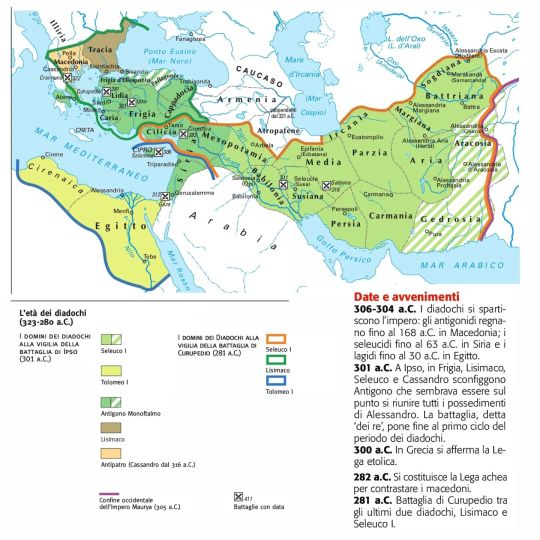
The Hellenistic world
"Atlante storico tascabile", Istituto Geografico De Agostini, Novara,1999
via cartesdhistoire
In 323 BC, Alexander died without heirs, possibly from the plague. His empire, already facing insurrectionary movements, did not outlive him. His generals, the Diadochi, began a protracted struggle for power: Antipater in Macedonia, Lysimachus in Thrace, Ptolemy in Egypt, Antigonus Monophthalmos in Asia Minor and Syria, and Seleucus in Babylon.
The first phase of the war among the Diadochi concluded at Ipsus in Phrygia in 301 BC, with the "battle of the kings." Lysimachus, Seleucus, and Cassander, son of Antipater, defeated Antigonus, who had been consistently victorious until then. Seleucus and Ptolemy, prudent rulers, founded dynasties destined for long endurance, even though they were not immune to the temptation of rebuilding Alexander's empire. The focal point of the conflict became Macedonia, and long wars ensued for its dominion.
The Epigones, successors of the Diadochi, instead supported the status quo. The kings of Egypt and Syria founded new cities, respecting the rights of existing poleis.
Nearly all Hellenistic kings surrounded themselves with scholars, artists, and scientists. Ptolemy I founded the largest library of antiquity in Alexandria, Egypt.
In 277 BC, the Galatians, of Celtic descent, settled in Asia Minor. Some provinces declared independence, including the kingdom of Pergamon, a city renowned for being built on terraces, distinguished by the splendor of its culture and art, exemplified by a library of 400,000 volumes.
The kingdom of Bactria, situated in the northern region of present-day Afghanistan, was also significant, representing the eastern extent of Hellenistic influence and serving as a crossroads between the cultures of the Mediterranean region and those of China and India.
Antiochus III, the greatest of the Seleucids, expanded the empire's territories. However, the invasion of Greece in 192 BC triggered a war with Rome. Following the war, the king was compelled to accept peace, marking the beginning of the inexorable decline of his empire.
84 notes
·
View notes
Note
Me consulting the wizard (local jstor employee):
I'm going crazy trying to find anything about the conditions of slavery in the achaemenid empire or the diadochi states afterwards, any idea where to even begin?
Assuming you have full JSTOR access, I was able to find this!
72 notes
·
View notes
Note
What do you think the world would be like if Marc Anthony and Cleopatra had beaten Octavian?
The most proximate outcome would be that Antony and Cleopatra's plans to carve out kingdoms for their children would have gone ahead:

Alexander Helios was named king of Armenia, Media and Parthia [Mark Antony had only conquered Armenia; Media and Parthia were not his to give away]
Cleopatra Selene was to receive Cyrenaica and Libya
Ptolemy Philadelphus was awarded Syria, Phoenicia and Cilicia
Caesarion was proclaimed the son of the deified Julius Caesar, King of Kings and King of Egypt (co-ruler with his mother)
Assuming Octavian's defeat results in his death, the legacy of Julius Caesar would have in theory fallen to Caesarion, but I suspect he would have had trouble exploiting it in practice. He was an infant for the brief period he lived in Rome; the rest of his childhood and adolescence was spent in Egypt. I doubt he would have the fluency in Latin and familiarity with the Roman politics to successfully leverage his claim to be the son of Julius Caesar into political power within the Roman context (i.e. convince Roman legions to fight for him or Roman citizens to vote for him). Evidently he really did share appearances with Julius Caesar, so that has to count for something, but I would guess that he would be seen as an "Oriental Monarch," hostile to Roman liberty. A product of a Roman man who was seduced by an Oriental Monarch and acculturated to exotic customs.
So, basically, the Roman Republic's expansion in the Near East would be halted (for a time). The same fundamental political arrangements as prevailed under the Diadochi would continue, albeit with slightly re-arranged borders and a new dynasty. Egypt would have retained primacy over these kingdoms, at least until the familial ties holding them together decayed (e.g. Is Egypt going to send troops to help defend Armenia from Parthian invasion if the rulers are cousins? What about second cousins?)
I'm not sure if I truly grasp Antony's long-term plans. Did he intend for these new states ruled by his children to be allied with Rome? He probably would have accomplished that so long as he lived and remained the uncontested master of Rome. But after his death, Rome probably would have looked to reconquer what he gave away within a generation or two.
28 notes
·
View notes
Photo

Achaemenid Kings List & Commentary
The Achaemenid Empire (c. 550-330 BCE) was the first great Persian political entity in Western and Central Asia which stretched, at its peak, from Asia Minor to the Indus Valley and Mesopotamia through Egypt. It was founded by Cyrus II (the Great, r. c. 550-530 BCE) whose vision of a vast, all-inclusive Persian Empire was, more or less, maintained by his successors.
The Persians arrived in the region of modern-day Iran as part of a migratory group of Aryans (meaning “noble” or “free” and referencing a class of people, not a race). The Aryans – made up of many tribes such as the Alans, Bactrians, Medes, Parthians, and Persians, as well as others – settled in the area which became known as Ariana (Iran) – “the land of the Aryans”. The tribe which eventually became known as the Persians settled at Persis (modern-day Fars) which gave them their name.
Artaxerxes V (r. 330-329 BCE) was the short-lived throne name of Bessus, satrap of Bactria, who assassinated Darius III and proclaimed himself king. Alexander the Great found the dead or dying Darius III (the original accounts vary on this) in a cart where Bessus had left him and gave him a proper burial with all honors. Afterwards, Alexander had Bessus executed and took for himself the honor of the title Shahanshah, the king of kings of the Achaemenid Empire.
Conclusion
Although the Achaemenid Empire was no longer what it had been under Darius I, it was still intact when Alexander conquered it. He attempted a synthesis of Greek and Persian cultures by marrying his soldiers to Persian women, elevating Persian officers to high rank in his army, and comporting himself as a Persian king. His efforts were not appreciated by the Greek/Macedonian army and, after his death in 323 BCE, his vision was abandoned. Since he had named no clear successor at the time of his death, his generals went to war with each other to claim supremacy.
These wars (known as the Wars of Diadochi, 322-275 BCE), resulted, in part, in the rise of the Seleucid Empire (312-63 BCE) under Alexander's general Seleucus I Nicator (r. 305-281 BCE). The Seleucid Empire occupied approximately the same regions as the Achaemenid and, though it rose to a position of strength, gradually lost territory, first to the Parthians and then later to Rome. The Seleucids were succeeded by the Parthian Empire (247 BCE- 224 CE) which fell to the Sassanian Empire (224-651 CE). The Sassanians revived the best aspects of the Achaemenid Empire and would become the greatest expression of Persian culture in the ancient world.
The Sassanian Empire preserved the culture of the Achaemenids and, even after its fall to the invading Muslim Arabs, this culture would endure and spread throughout the ancient world. Many aspects of life in the modern day, from the seemingly mundane of birthday parties, desserts, and teatime to the more sublime of monotheism, mathematics, and aspects of art and architecture, were developed by the Sassanians drawing on the model of the Achaemenid Empire.
Continue reading...
41 notes
·
View notes
Text
After Alexander the Great died, the Macedonian Empire began to fragment. Out of the wreckage rose the powerful Seleucid Empire, which lasted until its own fall in 64BC.
15 notes
·
View notes
Note
Do you think, if Hephaistion had outlived Alexander, that he’d become one of the diadochi?
I answered a version of this before HERE.
From the opening of that reply:
The now-ancient Dictionary of Greek and Roman Biography and Mythology, by William Smith, first published in the mid-1800s (you can still find it in older uni libraries like Penn State), described it as “fortunate” that Hephaistion died first, as he wouldn’t have survived long among the more robust personalities of the Diodochi.
Even those who haven’t read Smith sometimes seem to agree.
I don’t. With Hephaistion still alive, and more time for Hephaistion to consolidate his position, I think there’d have been a lot clearer succession.
BUT…
If Hephaistion hadn’t died, I don’t think Alexander would have either.
....
A reminder--and this is NOT a complaint against the asker--you can run searches on my blog for previous "asks," by keywords. Just include "asks" and then whatever you want to know, such as "If Hephaistion had survived" or (better) "death of Hephaistion" (to get a wider range of topics. I don't mind answering asks, but sometimes, if I've already written on it, I may just point you to the prior reply.
Please don't take that as "I don't have time for you." But I'm also not a big fan of reinventing the wheel. :-)
9 notes
·
View notes
Text
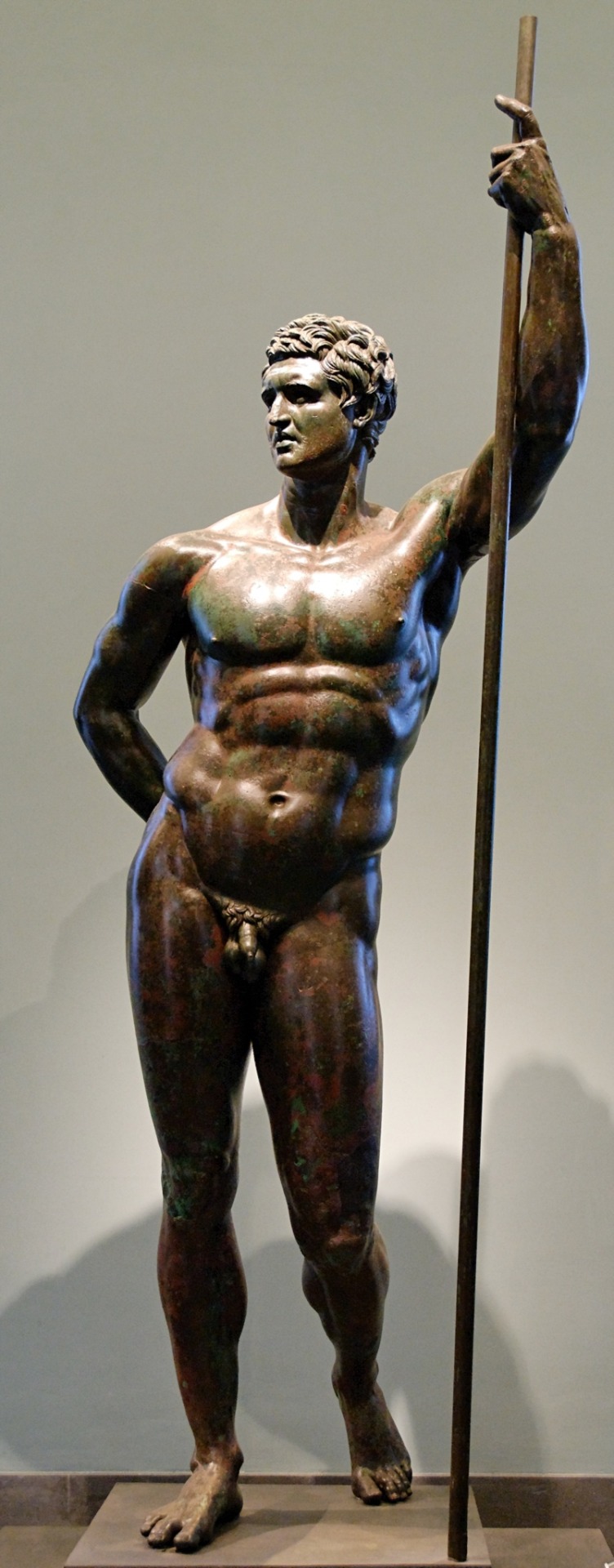
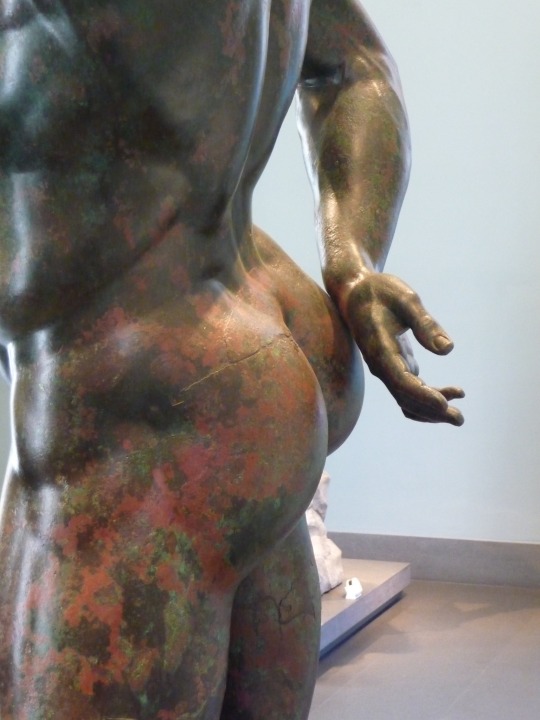
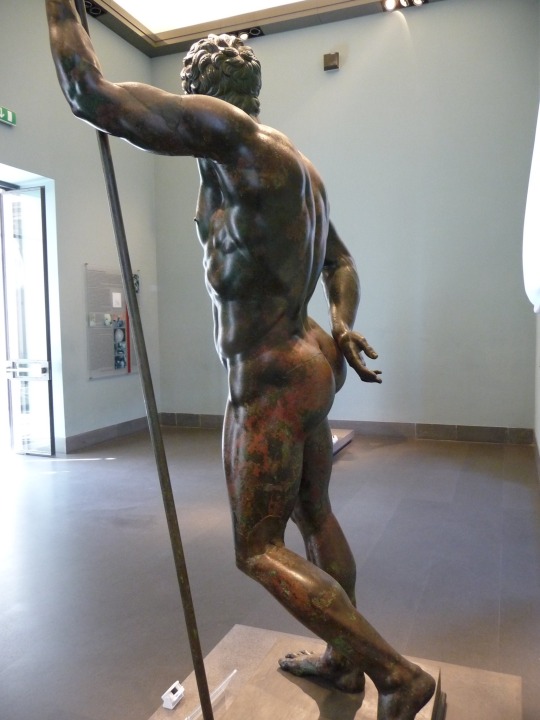
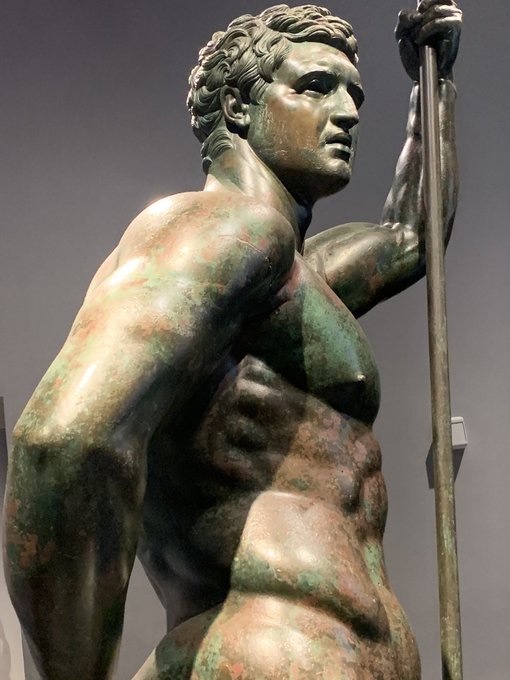
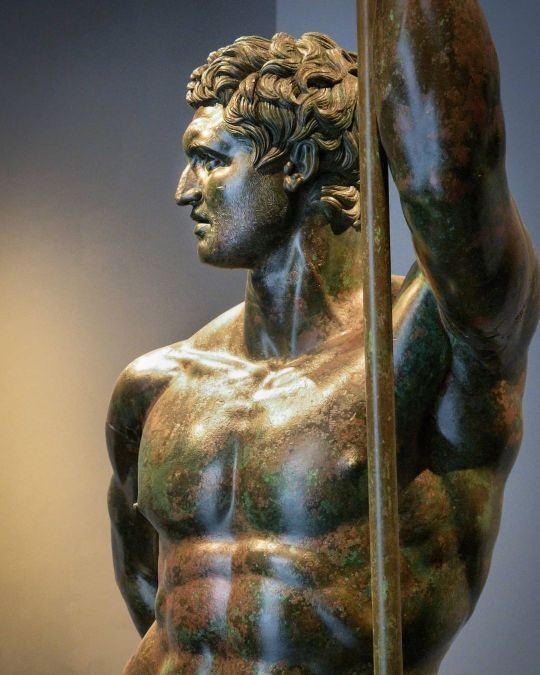

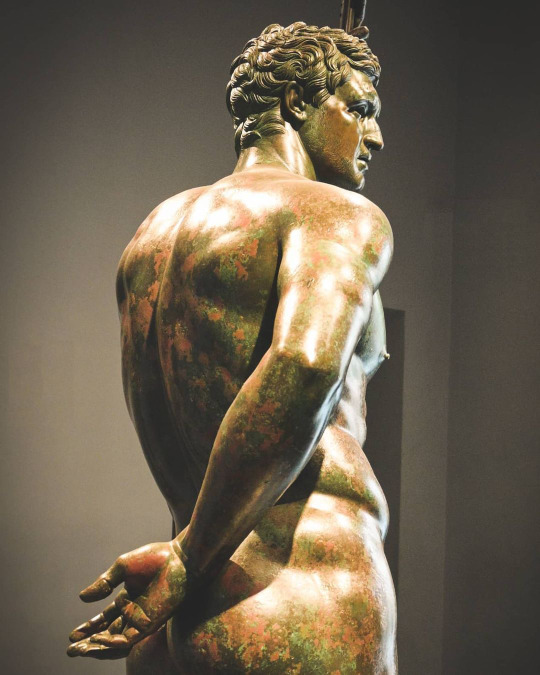
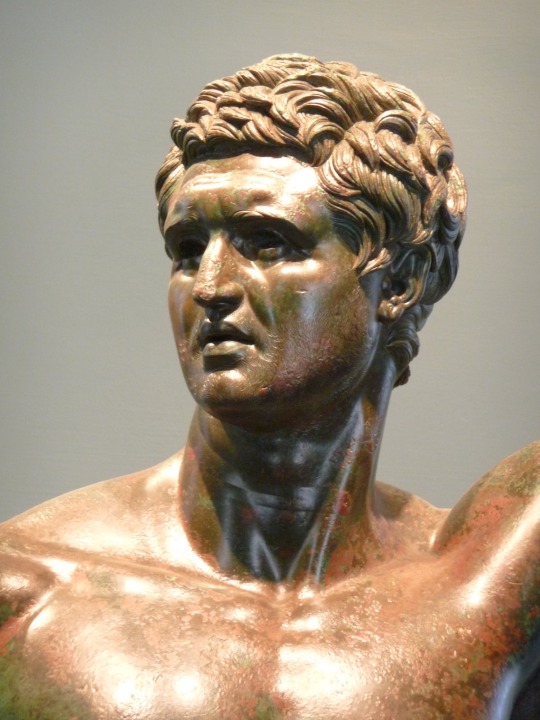
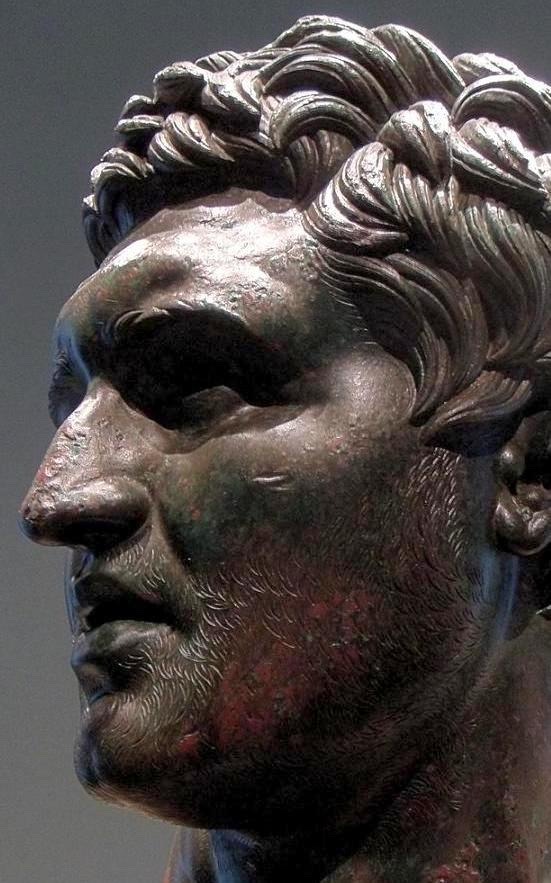
“The Hellenistic prince” or “the Seleucid prince” is a Greek bronze sculpture from the Hellenistic period (3rd-2nd centuries BC) that represents a naked young man (Attalos II has been wanted to be seen, but there is no consensus) who may being one of the diadochi (generals of Alexander the Great who divided up the conquered territories after his death). His body, perfect, muscular, allows us to see a winner leaning on his lance, with a penetrating gaze, lost in the horizon. His face shows a stubble.
Palazzo Massimo alle Terme, Rome.
818 notes
·
View notes
Text
Macedonians: "we're greek"
Greeks: "no you're not"
-
Diadochi states across the Middle East: "we're greek"
Greeks: "no you're not"
-
Byzantines: "we're roman"
Greeks: "what the fuck is happening"
66 notes
·
View notes
Text
Continuing my sequence of books read with these:
This first one is about the immediate phase of what most historians would term the Wars of the Diadochi or Successors. In this case when the Argead Dynasty remained alive and when there were bids to keep the multi-continental empire of Alexander the Great intact. The leaders here, Olympias, Eumenes, and Polyperchon, were the ones who were most dedicated to the prospect that in some cases could theoretically have happened that Alexander's empire would have become more like the Persian Empire that preceded it.
In the end they ultimately failed because Alexander's army had become a monster beyond the control of its wielders, and gleefully proceeded to teach its former masters lessons they would have preferred not to learn with fine impartiality. The lesson here, as with the life of Alexander, is one that the global South knows well and the global North keeps trying to pretend to forget.
Namely that power comes from the barrel of a gun, or in this era, from the hilt of the sword. The fall of the Alexandrine state was made just as its rise was, by bloodshed and the chances of war and the waging of war. There are no redeeming lessons in that, only a blunt demonstration of what reality is, and what it can be.
#lightdancer comments on history#alexander the great#wars of the diadochi#it's one of those ironies of where history's gone nowadays#once the Germans and Russians treated Europeans like they treated Africans war stopped being so fun to study#so this particular truth gets skipped over and as the rise of fascism shows neglecting it can be dangerous
1 note
·
View note